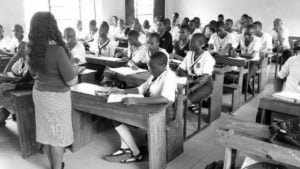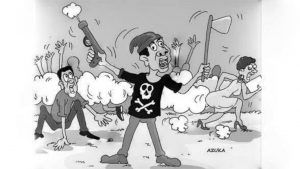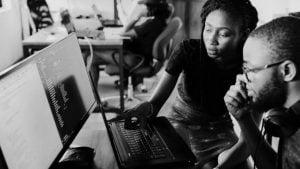Challenges and problems of Nigerian Education System and Solutions: Have you ever wondered why Nigeria is always counted as one of the countries with poor education system in Africa and in the world? Well, the reasons are not far fetched. In this article, we will be taking a comprehensive look at the education system of Nigeria, the problems of education and the solutions to the problems of Nigerian education system. I strongly encourage you to read this article painstakingly so as to enable you graps a thing or two from this work.

RECOMMENDED: Examination malpractice in Nigeria: Causes, effects and solutions
Education is the process of giving and receiving systematic enlightenment. Education could be in a formal setting or an informal setting. Informal setting here are places other than the academic environment, (that is schools) where an individual acquires values and skills. Education can be said to be in a formal setting where the students are engaged in learning in a formal environment (classes).
Education plays a vital role in the society, and a few of the contributions are:
a. Social development: Education undoubtedly leads to social development, as skills and values are acquired in a manner that would help sharpen the economy and occupational structure.
It serves as a tool for social integration: this it does, by integrating people into the bigger society. Education serves as a means of teaching students their place and usefulness in the society.
b. Personality development: Education goes a long way in developing the personality of students. When a child is born, his mind is a “tabula rasa”, meaning it is an empty slate, and it is up to the society to inculcate certain values, knowledge and develop his mind.
An educational system refers to the economic and social factors that constitute the school. These factors could ne funding, staffing, compensation or resources needed for the management and day to day activities of the school. Educational system is majorly influenced by the communication, exchange of ideas, funding and research of scholars and the government. It is worthy of note that these pertains to only public schools and universities.

Nigeria’s educational system is based on the 1-6-3-3-4 approach. What this means is that the child spends one year at nursery school, six years at primary school, three years at junior secondary school, three more years at senior secondary school completing the secondary school education and lastly, minimum of four years in the university or polytechnic (tertiary institutions). It is worthy of note that this system/mode was successfully used in a few countries like China, Germany, Ghana, before it was adopted by Nigeria.
Also see: Solutions to the problems of the judiciary in Nigeria
11 Major Challenges and Problems of the Nigerian Educational System
1. Infrastructural decay: The public institutions is a mess, as the buildings are more of dilapidated buildings than they are of learning environments, there are not enough classrooms teaching aids (laboratories, computers) and even the libraries are in a pitiful condition. Every year, monies are being allocated for the educational sector but nothing changes.
2. High tuition fees: the essence of public schools is for its affordability. A lot of people cannot afford to pay for these schools and end up being drop outs. In Nigeria, about 10.5 million are out of school, with finance being a major reason.
3. Nepotism in admission: Students write Jamb and post Utme, yet they are not given their deserved position because they are sidelined as nobodies or not belonging to a particular clan or ethnic group. This is also evident in the employment of lecturers, as tribe and language is considered over capability and expertise.
4. Cultism: Cultism is one thing that has eroded the educational community. The need for students to be feared and feel powerful is one reason for the advancement of this plague by the students, sexual harassment by teachers on their female students coercing them into having sex for grades, teacher victimization of students and a lot more.

Recommended: History of Education in Nigeria
5. Corruption: This is one major disease eating into the educational system. Examples are examination malpractice by students encouraged by teachers who have been paid to aid the process.

6. Greed: As you may known, problems always lead to another problem. Greed is a big problem in the Nigerian education system because most teachers aren’t paid as they are supposed. Consequently, even when the government finally decides to pay teachers, those who are the head of these school usually keep some of the money to themselves rather than pay the supposed salary or wage to school workers.
In most secondary and tertiary schools in Nigeria now, Lecturers/teachers don’t make enough money from their salary. They do this by collecting money from students or mandating them to get school materials for a pay or they will fail.
7. Outdated school curriculum: This is another huge challenge of the Nigerian education system. It is also the reason why Nigeria is lagging when it comes to technological growth, development and information in Africa as a whole. In most tertiary institutions in Nigeria, students are making use of old and outdated books. The worst of all is the fact that teachers and lectures who are assigned to teach are usually reluctant to keep students up to date with the trends in their fields of study. This is so because even the teachers are old too.
While other countries like South Africa, Canada, US and the UK are already making use of technology to solve academic problems for students, most Nigerian teachers are not even computer literate to start with. This is undoubtedly one of the biggest problems of Nigeria education system.
Recommended: Countries with the most beautiful women in the world
8. Bad parental upbringing: There is a popular adage that “Charity begins at home“. This goes to explain that whatever a child or student does in the public has already started at home. Parents are undoubtedly one of the most important parts of their children’s life and the way the children are brought up goes a long way to determine their moral standards.

Believe it or not, 40% of students who engage in examination malpractice frequently in school these days grew up where they didn’t find cheating as something bad. This could be because of their home or even the environment where they grew.
In light of the above, parental upbringing affects the education system of Nigeria indirectly. When parents try to bring up their children the right way it becomes hard for those children to engage in examination malpractice and it also becomes easier for the teacher to stop such acts.
Recommended: Countries with the best education system in Africa
9. Inadequate funding: Inadequate funding is an immediate problem facing the education system in Nigeria. This issue of inadequate funding has been in play for series of years, yet, it has not occurred to be a matter of concern to those in charge. The education sector ordinarily ought to be one of the sectors that is most invested in. It could be that several administrations have paid inadequate attention to the funding of the education sector because it seems not to be yielding immediate visible profit.

They have failed to understand that the impact of the education system is a long-term one which cuts across all sectors of a country’s economy and growth. Public schools in countries like Germany, France, Norway, Austria, Denmark, Spain, Sweden, Finland, Belgium, Brazil, Greece, Czech Republic, Iceland and so on, offer free tuition fees to students in their public schools. This is the extent of the countries’ investment in the education sector. This is the extent to which education is valued in such countries.
Who talks about free education in Nigeria? Would that ever become possible? Of Course, yes. But then, the basic funding should be made adequate first for proper revitalization of academic institutions. The education sector is the sector that has experienced the most number of strike actions owing to inadequate funding by government. The purposes of public schools have in fact been defeated as a result of inadequate funding. It is unusual for everybody to be wrong at the same time, so if the system is clamouring for a change, then there is certainly a call for attention.
Recommended: Most Popular People In The World 2024
10. Shortage of teaching staff/ unavailability of qualified teachers: Many Nigerian schools today have a single instructor teaching 3-5 courses, some of which they are not qualified to teach. Classroom teachers are compelled to become lab technicians, and some low-tier educational institutions do not even have teachers to take certain courses. These disappointing situations are a result of the lack of qualified teachers in the school system.

The poor working conditions, low pay, and inadequate benefits that Nigerian teachers must endure have deterred many capable and qualified individuals from entering the teaching profession. Those who have, however, do so out of a lack of better employment opportunities, which accounts for their lack of commitment as they are constantly looking for better opportunities. The resultant effect is a substantial fall in the quality of education in the country- which is heavily evident in the educational output.
11. Poor infrastructure and training facilities: In Nigeria, the majority of schools and institutions are in terrible shape. The majority of states have unfavourable educational environments.

The majority of the structures lack teaching materials and are in poor condition. Practical or technical resources are lacking in schools. Because of a lack of standard and up-to-date practical facilities, education is more theoretical and quantitative than qualitative.
Recommended: Advantages and Disadvantages of shopping online
For more about the problems of Nigerian education system, I encourage you to watch the YouTube video below. It highlights some other problems of Nigerian educational system not mentioned above.
Recommended: Highest paying businesses in Nigeria 2022
Solutions To The Problems Of Nigerian Education System
a. Appointment of capable persons as minister and commissioner of education: the commissioner of education and minister of education should not be appointed based on politics but on what they are capable of. Nigeria’s educational system has fared better in the hands and control of professional and expert ministers than in the hands of politicians who see everything as a medium to play politics. For example, in 1985, when Professor Jubril Aminu was minister of Education, progressive steps were taken. It was during his tenure that the 6-3-3-4 educational system was introduced. He also introduced nomadic education for the Fulani who are always on the road.

Another example of an expert minister of education is Professor Sam Egwu. During his administration, he entered into a pact with ASUU (Academic staff union of universities), providing conditions of service, funding of tertiary institutions, autonomy of universities and means and payment of lecturers. This is the pact causing trouble recently, as successive administrations are yet to fulfill the pact on the account that it is too much for them to handle, due to inadequate funds.
Again, Professor Babatunde Fafunwa, appointed in 1990, also made gigantic steps during his time. He introduced education using our indigenous language, this being one of the first, in Africa, as the usual language then was English.
These, in respect to now, goes a long way in proving that experts do better when placed in positions in correlation with their area of expertise, instead of a semi educated person who’s there only to advance political interest and barely knows his left from right.

Recommended: Differences between Democracy And Republic
b. Adequate Funding: the monies allocated to the educational sector, part of which even gets to be embezzled, is very low. Thus, schools are learning to seek for ways of funding which as led to high increase of school fees (which has become too high for the poor people to afford) and commercialization of the schools, others, which have been neglected are in a poor, miserable states with low infrastructures and dilapidated buildings. If things continue like this, there will soon be no opportunity for schooling for the poor and average people in the society as schooling would be very expensive.
Hence, privatization is not the answer. Money spent on wasteful expenditure should be diverted to funding schools and renovating the buildings. Also, reading material and other materials needed for the running of the school should be provided by the government, to help make life easier for students.
c. Research: The Nigerian universities should be at the fore front of research in the country, especially in the sciences department. Libraries should be updated with recent books, research projects should be given utmost importance by the government and funding should be made in that respect.

d. Striking: the academic union for universities, polytechnics, and secondary schools are known for persistent strikes, and this is without fault; the government fails to pay them their dues and give them certain right to which they are entitled to. There is a need for this to change, in order to progressive movements to be evidenced in our educational sector. The teachers and lecturers should be paid their dues as and at the time due.
e. Anti-cult: Anti cultism groups should be created in schools with an aim to stopping cult practices in universities and schools and arresting offenders to the point of prosecution.
Also read: Reasons why women don’t participate in politics: 7 Reasons
In conclusion, the future of Nigerian educational system, now, is bleak. But there is still hope and this is subject to the seriousness of the government and the will to make it work. Government should place all hands on deck and seek to return the educational sector to its former glory.

Edeh Samuel Chukwuemeka, ACMC, is a lawyer and a certified mediator/conciliator in Nigeria. He is also a developer with knowledge in various programming languages. Samuel is determined to leverage his skills in technology, SEO, and legal practice to revolutionize the legal profession worldwide by creating web and mobile applications that simplify legal research. Sam is also passionate about educating and providing valuable information to people.
points of correction parent are never part of problems in Nigeria,quite alright you have shaded some lights in some of the problems,the current dillema that education found it self, its not resulting from from poor parental child upbringing rather,its the government,and system of governance in our country,a very clear example ,you take your children you are expecting them to be given the exepected changes,but the revers is the case,a child will finish his jss well equipped in exams malpractice a teacher guide him well how to prepare for ssce malpractice,and other offenses related.
Parents contribute to the problems facing education in Nigeria. Some of them before registering their wards in a school they will ask for their SSCE result sheets and proceed to ask shamelessly whether their wards will be assisted during the exams. If I may ask, who do sponsor outside WAEC exams for their children? Currently, the outside WAEC lives in our secondary schools nowadays. There is no exception on the problem of education in Nigeria. We all must stand to build back our education system.
I sincerely appreciate your work
Parents also contribute to the problems facing education.They even ask the school authority may be their wil pass